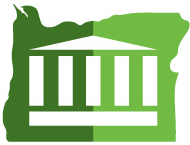Oregon State Bank
In the wake of the 2008/2009 global financial crisis--triggered by banks considered "too-big-to-fail" and plunging the world into the great recession--a number of Oregonians began looking for opportunities to try and insulate Oregonians from some of the worst predations of global finance. One proposal looks at creating a state bank for Oregon, modeled on North Dakota's successful state bank.
From the Oregon Working Families Party A State Bank for Oregon web page[1]:
The Problem
The financial crisis brought on by the “Too-Big-To-Fail” banks plunged the country into the worst recession since the 1930s. But while the federal government bailed out the nation’s biggest banks and corporations, the rest of the country has been left to fend for itself. Two years, six million foreclosures, and eight million lost jobs later, the financial system is not meeting the needs of America’s working families.
Community Banks and Credit Unions vs. Too-Big-To-Fail Banks
All over the country, Americans have made the decision not to support the banks that wrecked our economy, and instead to patronize local banks that invest in local communities. This “move your money” effort is helping to strengthen local banks and credit unions, which lend to local farmers, business owners, students, and homeowners. This kind of lending is critical to a strong economy.
But did you know that the State of Oregon deposits billions of our tax dollars into the very same Wall Street banks that crashed our economy?
It is clear that moving our personal money is not enough to break our state’s dependency on Wall Street and provide the capital that Oregon’s farms and small businesses need to grow. We have to do more, and that is why the 2011 legislature is preparing to consider a proposal from the the Working Families Party to create a publicly-owned bank that would partner with local banks and credit unions to help meet the financial needs of Oregon’s economy.
The Model
Since 1919, North Dakota has been served by its publicly-owned bank, the Bank of North Dakota. All state and many local agencies deposit their funds with BND. BND then performs banking services in the public interest, such as
- Partnering with North Dakota banks to make agricultural, small business, and economic development loans;
- Providing low-cost student loans to North Dakota students;
- Lowering mortgage rates for North Dakota homebuyers;
- Serving as a “bankers’ bank” for small banks in North Dakota, which lowers their costs and allows them in turn to provide lower-cost services to North Dakotans.
Learn more at http://www.banknd.com/.
The Case
The Bank is a profitable business, but unlike private corporations, the profits belong not to shareholders and CEOs, but to the State of North Dakota, which enables the State in some instances to lower taxes.
The Bank is insulated from corruption by an independent management and is subject to the same financial management rules as other banks. But because the Bank of North Dakota belongs to the people, it can direct its activities in ways that benefit the businesses and the citizens of the North Dakota.
An Oregon State Bank would not compete with local banks and credit unions, but instead would partner with them to ensure that Oregon’s money is put to work in Oregon.
See Also
Oregon State Bank Bill - Public Forum - Tuesday February 1st, 2011
